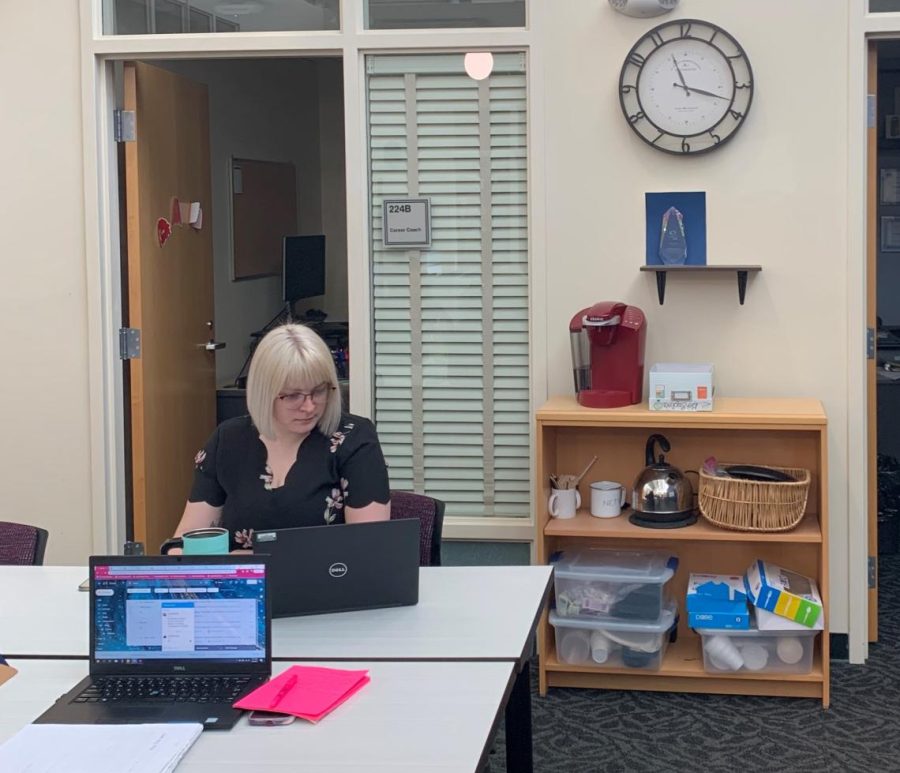UNCA Community highlights importance of ‘Soft skills’ to professional success
Lauren DeHann, associate director for career education, works in the career center.
April 20, 2022
According to UNC Asheville alumni and career center staff, soft skills – interpersonal skills, such as communication and teamwork – rocket students to professional success.
“An employer will say to me, ‘I can teach the skill. I can teach how to perform an action, but I can’t teach someone how to be a good teammate or a good communicator,’” said David Earnhardt, associate director of employer relations in the career center. “That’s something that the student needs to come to the table with on their own.”
A study from the Federal Reserve Bank of New York found only 27% of students with undergraduate degrees have jobs that match their majors, with figures varying greatly from major to major. For instance, computer science majors work in their chosen field 80% of the time. The study still urges students to learn flexible skills if they want to stay afloat and impress employers.
“They’re looking for someone’s ability to communicate, someone’s ability to work in a group and as a team, they’re looking for someone who can analyze data and understand how to do research,” Earnhardt said. “Those kinds of soft skills are harder to teach on the job – a work ethic, someone who’s going to show up on time, someone who is going to take direction well. Those kinds of things are what a university can help a student learn regardless of what their major is.”
Earnhardt said he originally majored in communications to work in radio, but went back for a master’s degree in college student personnel.
“Pretty much every single person who’s worked here has worked in an industry outside of higher education,” Earnhardt said, gesturing broadly to the career center.
“The old “40 years and a gold watch” thing was a solution for a different time. Folks have a different value set now,” he said.
Employment has become more mercurial than ever. According to McCrindle Research, which studies differences between generations, members of Generation Z are expected to have 18 jobs across six careers before they retire.
UNCA alumni Greg Garrison, 40, co-owns The Hop Ice Cream Cafe with his wife Ashley Garrison, 38. Neither of them majored in business.
“The Hop was an accident and not an accident. Ashley, who has a degree in cell molecular biology, and I both worked in The Hop when we were students,” Garrison said.
Garrison said he originally majored in math at UNCA. Even so, he manages the external side of the business, including marketing, promotion and customer service. He said he learned these skills from UNCA’s liberal arts core.
“I was forced out of my comfort zone several times and got comfortable with being out of it. That has allowed me to feel a lot more confident in my ability to communicate with other people. The most important thing we could possibly promote is communication skills,” Garrison said.
Even after learning to run a business, Garrison said he isn’t satisfied. He’s relentlessly exploring new topics, from astrophysics to little league coaching. He said he wants to be a lifelong learner, and college sparked that desire.
“College is less about the degree and more about the experience of taking your ability to learn to the next level. If you become a professional student, you can pick things up so quickly,” Garrison said. “In athletics, people can jump from one sport to the other. Those muscles in your brain and the confidence that results from taking classes you don’t necessarily want to take is invaluable as you go forward.”
Michael Lyles, a junior studying new media, said the college experience itself is what’s teaching him the most.
“Learning to trust myself is the best lesson I’ve learned at university, more than anything I’ve learned in the classroom,” Lyles said.
He said there should be more hands-on learning built into the UNCA curriculum, and less outright instruction.
“I feel like we have such a guided way that we expect the professors to know everything and give us everything, when in reality learning is very hands-on, learning is very individualized,” Lyles said.
He said a very hands-off photography class left him scrambling, but as he relaxed and eventually learned the medium, he found it a powerful experience.
“Following my intuitions and really trusting myself to learn it, and not just have someone tell it to me, I feel like that was way more valuable than just sitting in a classroom falling asleep,” Lyles said.
Although he said he’s worried about stability and the cost of living, Lyles remains optimistic and more focused on job satisfaction than prosperity.
“I feel like the most important thing for me is doing what I’m passionate about, because otherwise I feel like there’s no reason to live. I don’t care if I’m making money at an office,” Lyles said. “I don’t care.”
Earnhardt urged students to be brave and patient as they enter the workforce.
“People think that success looks like a straight line – straight up, it’s a 45-degree angle. What it really looks like is this – a curvy line that doubles back on itself and curls up and goes up in the same direction, but it takes a little while to get there,” Earnhardt said. “As long as folks are being true to themselves about what they like and where they like to be, changing their career is always going to be a net plus.”


















